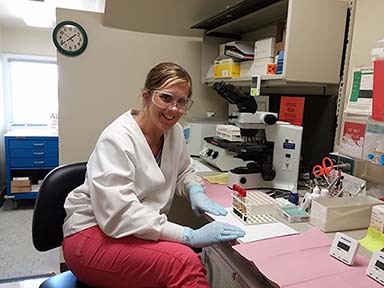
| July 2015 | |||||||||||
| Top stories | |||||||||||
| In the news | |||||||||||
| Photos | |||||||||||
| Contact us | |||||||||||
| Archive | |||||||||||
|
Project expands onsite testing in Black Hawk County |
A unique partnership between the State Hygienic Laboratory and Black Hawk County Health Department began in March to improve testing methods and timeliness of results.
The six-month pilot program was initiated after the health department – based in Waterloo – went through staffing changes and found itself in need of laboratory testing revisions to meet Clinical Laboratory Improvement Amendments (CLIA) standards.
Under the program, Wade Aldous, director of the State Hygienic Laboratory's Disease Control Division, is serving as the health department's CLIA director, as he does for the Hygienic Laboratory. Aldous said that he oversees proficiency testing, record-keeping and quality control.

Medical laboratory technician Kizer Friedley
"There are a lot of checks and balances to make sure you're giving the most timely, correct lab results to the provider, so they can treat their patients appropriately," he said.
Aldous reached out to find someone with the expertise to draw blood samples and run lab tests during the county's weekly sexually transmitted disease clinic. He found Kizer Friedley, a medical laboratory technician (MLT) who works for Covenant Medical Center and is an adjunct instructor at Hawkeye Community College. Friedley can run some tests on-site, which benefits the patient and the provider.
"In some cases, health care providers can get a result while they're with the patient and can begin treatment immediately," Aldous said.
Having Friedley run the tests allows the staff to operate more efficiently and see more patients, said Eileen Daley, Health Planning and Disease Surveillance manager for the Black Hawk County Health Department. "They can maximize their time and do assessment, education and referral," she said, rather than spend time running tests.
Daley said the county's communicable disease team is “on board” to continuously review the scope of the work to support the best alignment of clinical services with the appropriate level of public health work, with a goal of increasing client capacity during clinic hours.
The pilot phase allows evaluation of current processes, testing menu and general laboratory operations. It also provides assurance for optimum efficiency, highest quality of testing, maximum cost effectiveness, and compliance to all regulatory and industry standards.
Friedley not only runs the lab tests, but also manages inventory supply for the health department's various locations and, along with Aldous, is developing standard operating procedures for the department. "It's been a really great experience," said Friedley, who received her bachelor's degree at the University of Northern Iowa, her MLT from Hawkeye Community College and is testing for board certification as a medical technologist. "It's been a really nice fit."
Communication with the public health nurses helps to smoothly roll out changes, Friedley added.
"She's done a remarkable job in writing procedures and putting quality control together," Daley said. "We're confident that everything we're putting in place is improving our quality control."
Daley noted that the health department will be better prepared for the next CLIA review, and the partnership with the Hygienic Laboratory could help in future endeavors.
"We have such a strong history of working well together," Daley said, pointing to communicable disease investigation along with the Iowa Department of Public Health. "We've really strengthened that relationship and that trust across the agencies."
Aldous, a microbiologist who began as associate director at the Hygienic Laboratory last year after retiring from the U.S. Army, said the partnership is likely the first of its kind. “It would be neat to see if we could replicate this in other areas,” he said.